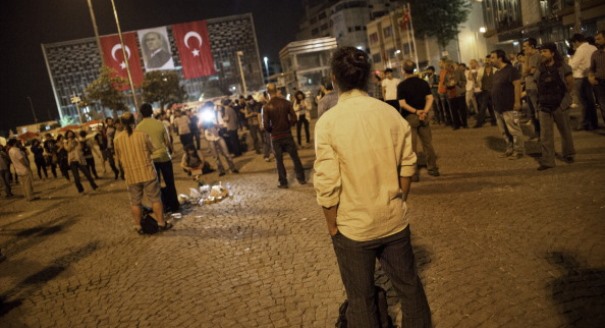Initially, the Gezi Park protests were simply about a few trees. Then, Turkey’s simmering discontent morphed into a new political situation, in which a large segment of Turkish society refuses to be “force-fed” conservative norms by the ruling Justice and Development Party (AKP).
In many ways, Turkey’s forthcoming elections will be about choosing whether to impose religious values on the whole of Turkish society or to aim for a balance between conservatism and liberalism. That choice will affect Turkey’s social harmony, economic performance, and international role.
Foreign observers of Turkey agree that the country today is ruled with more authoritarian leanings, more majority-based politics, and more religiously conservative values than a decade ago.
To use a simple metaphor, Turkey’s political pendulum for a long time leaned toward secularist Kemalist ideology. Since 2002, the AKP has brought the pendulum toward a more religious-conservative set of ideals.
Since the Gezi protests earlier this year, the Turkish government has opted to polarize rather than appease the situation. That has made the demonstrations a lasting feature and has brought discomfort to the AKP’s ten-year rule—not to mention the severe economic consequences for the country.
Looking ahead, the question is whether the ballot box and, ideally, inclusive consultations will succeed in shifting the pendulum to a point of equilibrium that all parts of society can accept, or whether sheer electoral force will keep the pendulum where it currently hangs.
The government’s readiness to adapt will be measured in the municipal and presidential elections of 2014 and the legislative elections of 2015. In one year’s time, the current prime minister, Recep Tayyip Erdoğan, could have become the republic’s first directly elected president or could be on his way to becoming its first fourth-term prime minister. In eight months’ time, the AKP may also be at risk of losing control of the Istanbul Metropolitan Municipality, a symbol of major significance.
In this context, Turkey’s social harmony will be a key factor in the coming months. In all likelihood, citizens who reject conservative norms will not return to silence. Calm seas for the AKP are a thing of the past. Many conservative citizens are also against the idea of polarizing society to the point where social conflict hampers economic growth.
Turkey has had twelve years of largely successful economic and social policies. Inflation was brought under control, a sound banking system was established, infrastructure was developed, foreign direct investment was increased, and exports were given a strong boost.
But with its ambitious economic objectives and insufficient natural resources and domestic savings, Ankara needs steady foreign capital inflows for the long term. In addition, Turkey has only a temporary competitive advantage in today’s industrial world. Its innovation and technological capacities are limited, and its demographic makeup is ineluctably in decline.
In other words, Turkey’s future prosperity relies heavily on the judgment of international investors, banks, and rating agencies. Inevitably, this judgment is also about the country’s democratic credentials and social landscape.
Domestically, Turkey’s political leadership may opt to strive on polarization and repression. But this is incompatible with the country’s normal functioning, reliance on exports and foreign investment, and Western affiliation.
In today’s interconnected world, there is no such thing as one narrative for the domestic audience and another on the international scene. Consistent messages are essential.
In the weeks since the start of the Gezi protests, the government has ignored calls for moderation from both liberal and conservative circles. It has increased repression against the media, doctors, and activists, and passed more decisions of the kind that triggered the protests. Such a course of action may be difficult to reverse.
For the time being, the sad conclusion of recent events is that the government’s credibility has been dented, and it is clear that Turkey’s varnish of international prestige has faded. Yet, this doesn’t mean that the AKP will be defeated at the polls anytime soon. Many observers say that probably won’t happen.
Internationally, Turkey is akin to the Western world by virtue of its geography and economic outlook, its stated willingness to improve its democratic credentials, its membership of the Council of Europe and NATO, and its EU accession negotiations. Yet, the official response to popular protests—based mostly on societal cleavage and repressive law-and-order policies—is not in line with Western norms.
Judging by what Ankara has been saying since early June, the Turkish government’s stance on fundamental values is now at odds with EU principles. It has also used strong language against EU institutions and leaders. When the EU holds a debate on Turkey this fall, there will inevitably be calls to halt the country’s accession negotiations.
But that debate will take place on new bases on both sides. Despite all rhetoric to the contrary, Turkey does not have the luxury of dropping its EU accession bid; it needs the EU. At the same time, half the Turkish population now strongly upholds European-style fundamental values. For the country’s EU partners, engaging with Turkey more decisively on governance issues while strongly supporting its democratic forces will be of central importance.
Turkey faces tough choices in the months ahead. The path it chooses will have repercussions both at home and beyond the country’s borders.







